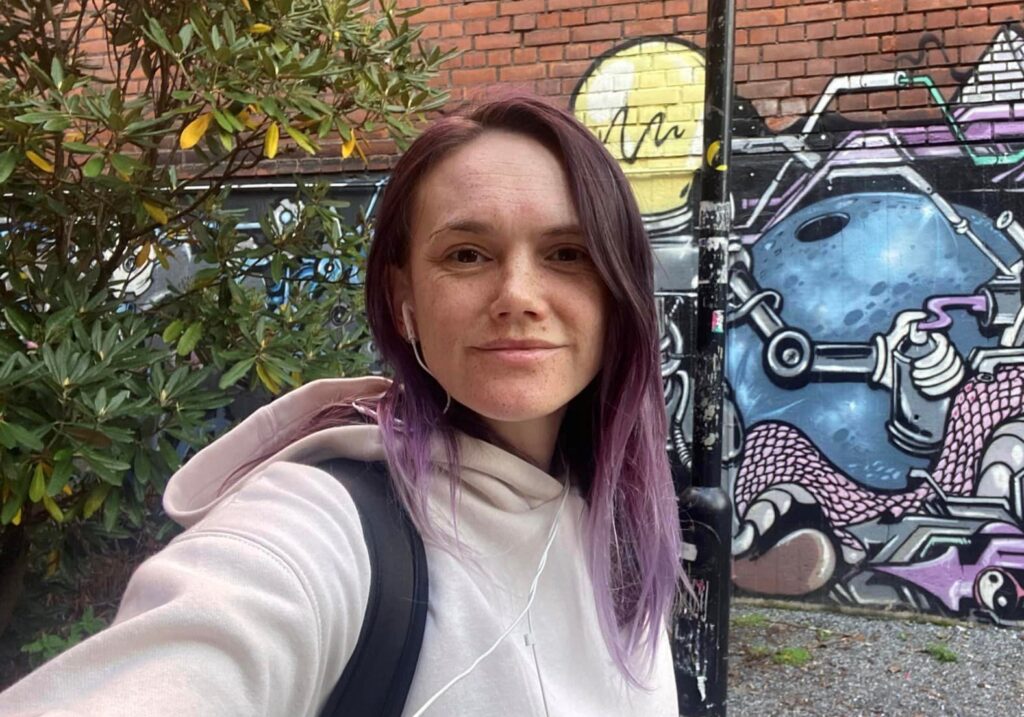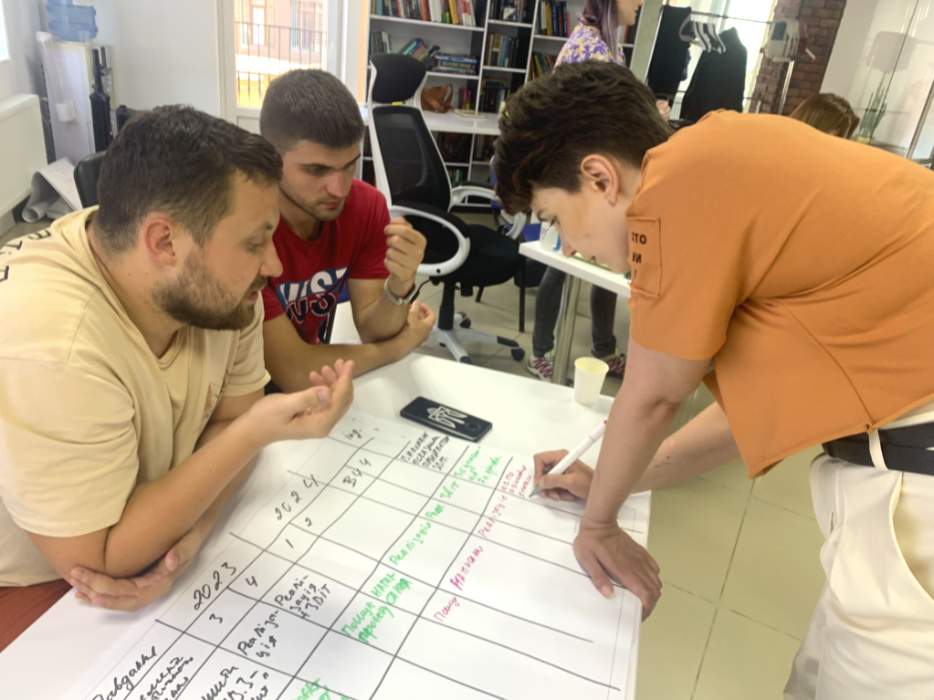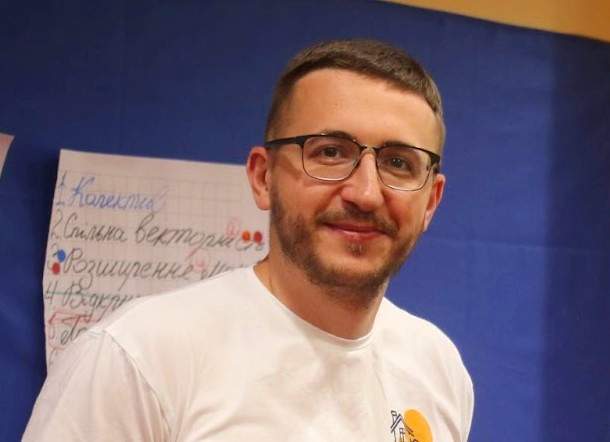Strategizing LDN organizations as a response to the challenges of war and driving grassroots initiatives
Publication date: December 1, 2023
Oksana Riabchun, Communications Manager at the Legal Development Network
Since the onset of full-scale war, member organizations of the Legal Development Network (hereinafter referred to as LDN or the Network) and other civil society organizations have found themselves in new conditions, responding to new challenges. To enhance their effectiveness, the Network supported developing and updating strategic plans for organizational development over several years. Overall, nine member organizations of the union have already conducted strategic sessions. How this aids them in navigating a crisis, the benefits of the strategic planning process as a whole, how it catalyzes grassroots initiatives, and how the Network promotes their organizational development will be further discussed.
“We need to reassess our strategies and goals in this new reality…”
Since the start of the full-scale war, most member organizations have undertaken previously uncommon activities — providing psychological aid, settlement, evacuation, job placement for displaced persons, humanitarian aid to communities, and more. The Podil Center for Human Rights, one of the Network’s founding organizations, redefined its strategic development plan to expand target groups and strengthen the team by incorporating young professionals while preserving the organization’s experience.

“At the beginning of the war, we reacted to everything around us,” recalls Head of the Podil Center for Human Rights, Mykhailo Bardyn (Vinnytsia oblast). “Later on, we better understood that life hadn’t stopped, and we needed to reassess our strategies and goals in this new reality. After five years of stable teamwork, we felt the need for a ‘fresh perspective’ and an active approach in these new circumstances. We must understand how to continue our work with a new office in western Ukraine. Our organization remained true to its goals, but now our clients are not just individuals; they encompass entire groups, like volunteers. It’s important to assist in bringing vehicles and medicines to all hospitals, organizing border crossings for volunteers transporting goods, and providing them with documentary support,” he explains. “We expanded the target groups we work with. We also incorporate mentorship knowledge obtained from the LDN into our new strategy.”
Due to the widespread war, many organizations had to relocate and reprofile themselves. Many must devise strategies for resource engagement. For some, it’s essential to strategically determine how to develop their website and other informational resources of the organization.

“The strategic sessions are part of the institutional support for organization members because significant changes have occurred in their work since the war began, and activities need to be organized,” explains LDN’s Organizational Development Director, Iryna Chaika. “Through these sessions, we compensate for their lost institutional support.”
Among the Network’s members is an organization that joined directly at the outset of the full-scale invasion. Working with resources to influence the community is vital for them — this is the Triangle NGO from Kolomyia in Ivano-Frankivsk oblast. The strategic planning process allowed the organization to define priorities and align the team’s shared vision.

“We didn’t have a developed strategy, but as a result of the session, we focused our work, highlighted new directions,” shares Solomiia Zinets-Matsyshyn, Head of Triangle NGO. “Strategic planning allowed us to envision and describe these directions, comprehend the need for goal specification, and role distribution within the team.”
Throughout the strategic planning process, the team decided to specify what motivates them and how to allocate responsibilities while also identifying areas they would not engage with, such as medical treatment and physical rehabilitation. However, they are interested in aiding psychological and social rehabilitation, providing support for job placement, and starting businesses.


“We identified a previously overlooked direction that remains significant for a certain segment of the team — cultural and artistic activities. This inspires team members,” shares the organization’s leader. “Due to discussions, we decided to utilize this sphere, including it in reintegrating internally displaced persons (IDPs). The well-known social initiative “Vulyk Zmistiv” (Beehive of Meanings) will now be solely related to IDPs. Regarding LDN’s strategy, we maintain shared priorities like legal education and consultations while also developing work in the sphere of IDPs and a new focus on veterans of the current war,” shares Solomiia Zinets-Matsyshyn. “This is institutional development — we recognized the importance of long-term planning. Recently, in a conversation with a donor, we shared that we have a strategy and are developing an operational plan. This demonstrates the seriousness of our intentions.”

Utilizing strategy as an element of institutional development is an effective tool for achieving goals, emphasized Vitalii Okhrimenko, LDN’s Strategic Development Director.
“A growing team with ambitions requires understanding what and how to achieve,” he detailed. “During strategizing, genuine team building occurs, discussing key points and conflicts of interest. It’s a period of change where an organization’s childhood stage ends and its mature life begins. If a team has a strategy, it evolves.”
Through strategizing, LDN’s members had the opportunity to perform a kind of resource revision, see their place in the market of services, and the overall development perspective, similar to what the Kamianets-Podilskyi Lawyers’ Association did.

“For local organizations, it’s not just important but necessary,” concluded Maksym Ilchyshen, Head of the Board and Program Manager of the Kamianets-Podilskyi Lawyers’ Association. “The organizational development of our association was similar to the development of the Network. Tasks that were relevant 5–10 years ago are no longer so. Our previous organization’s strategy failed, first due to the COVID-19 pandemic and then full-scale war. We have now identified the niches in which we focus our work. It’s time to change the focus to more global matters. We provide legal services. And they are not so popular now. When we started online chat for consultations, we were the first. Now, others are working like this. All members of our organization are lawyers, so we decided to rethink legal aid itself — to provide it to communities so they can organize such a service.” Currently, the team sees their development in providing mentorship for community services, expertise, research, and ensuring the standards of legal aid quality.
“We implemented grassroots initiatives within the strategy…”
“Through strategizing, we demonstrate the power of the next model — when a membership organization with a team, its strategy, and the Network implements joint projects for several such member organizations,” summarized Vitalii Okhrimenko. “We support member organizations to consolidate their network around common values and work on overcoming the consequences of war.“ Thus, the strategies show that project ideas and priorities are developed based on specific circumstances and needs. It is crucial to consider the context and interests of stakeholders in each community for the organization to address their issues.
“Regarding grassroots initiatives, I’d like to mention the situation with co-owners of apartment buildings concerning major repairs in one of the communities in the Chernivtsi region,” recounted Mykhailo Bardyn. “After our intervention, we helped clarify the responsibilities of the housing co-operatives and the city council and how the parties should act according to the law. As a result of such training, public protests ceased, and people understood their rights. We implemented these manifestations of grassroots initiatives within the strategy, where we envisioned interaction with local self-government bodies in small settlements to identify conflicts or situations of social tension and influence their resolution through our tools.”
While developing the project idea to counter russian propaganda, the Podil Center for Human Rights established partnerships with several communities, creating a potential network for future joint projects. Additionally, a micro-network is being formed based on small communities in the region and their connections with neighboring regions to gather questions for legal consultations. The team continued cooperation with the Ukrainian Paralegal Association to assist in resolving legal issues in communities.

“While LDN’s strategy focuses on strengthening the organization’s members, their management processes through strategizing, learning, fundraising for joint projects, and targeted support in line with the Network’s existing rules, it is not fully adapted to today’s challenges. Therefore, we aim to update it, considering our organization’s activities. This way, the association will empower its members, and the organizations will strengthen the association,” noted the LDN’s Executive Director Olga Nastina.
The Legal Development Network, founded in 2009, unites civil society organizations throughout Ukraine that provide free legal aid, education, and advocacy, including addressing the issues of internally displaced persons and combatants.
Every month, thousands of individuals seek assistance from member organizations and online services within the Network for legal support. Collaboration with local self-government allows for solving community issues at the local level.
The Network’s work is aimed at legally empowering citizens, creating conditions for community self-development, enhancing institutional capacity, and contributing to a vibrant civil society.
The material was created with the support of the international charity platform GlobalGiving and the Charles Stewart Mott Foundation. The publication’s content is solely the responsibility of the Legal Development Network.
P. S. In June 2024, the Legal Development Network (LDN) launched a crowdfunding campaign, Recovery of The South of Ukraine , as part of the crisis response program #StandWithUkraine.
You can Recovery of The South of Ukraine |
If you have notices an error on the web-site, please, highlight the text and press ctrl-enter.
Have you found your solution? Help others!
Print a poster
Print and place the Network's poster on a notice board in your entrance hall
Become a volunteer
Become a volunteer and assist others in finding problem solutions
Do you need a consultation ?
Online chat
Ask question and one of the LDN's lawyers
will answer it.
Chat's schedule: from 10 to 16
every day
Chatbot
Ask questions via LawLink Bot in any convenient way. LawLink Bot is a smart and digital legal assistant created by the Legal Development Network.

Our initiatives
The Legal Development Network implements comprehensive projects aimed at strengthening human rights, developing capable communities, and building sustainable tools for access to legal aid. We work at the intersection of advocacy, legal education, and local coordination of humanitarian response.
